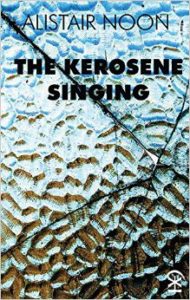The Kerosene Singing
 by Alistair Noon,
by Alistair Noon,
Nine Arches Press, Rugby, U.K., 2015,
64 pages, paper, £9.99,
ISBN: 978-0-9931201-6-9
Buy the Book
Alistair Noon is a native Brit who has lived mainly in Berlin for the past twenty years or so, and along the way mastered not just German but Chinese, Russian, and good bits of several other languages. His poetry, as his recent collection The Kerosene Singing reveals, is a product partly of a deft sense of logopoeia — or “dance of the intellect among words,” as Ezra Pound instructed us — and, moreover, a masterful skill with the musical properties of words, or melopoeia, and the dreamlike states music coaxes from reality.
Noon’s subject matter covers, in a British ex-pat idiom, the gist of the postmodern sensibilities of this era: the relationship of personal to sociopolitical life; the ironies of power, especially in foreign lands; the strangely meaningful emptiness of the everyday; and the general ridiculousness of practically everything.
These subjects are bound mainly into little narratives that tend to start out as some kind of a foreign excursion, journey to a friend’s apartment, or shuffle home. At the outset of “Riding Home with Michel Foucault,” the speaker is on a train platform peering at its surrealistic announcement board. Then:
I run for the doors
to take my temporary seat
and read the origin of laws.
The books beside me speak:
“Where are you now on the market?”
“Are you sure you’re on the right diet?”
This State is my life, it asks me
to ride and read by night . . . .
Here, and often in Noon’s world, the everyday is permeated in dreamlike ways by sociopolitical pressures. In “Ode on a Bottle of
Maotai,” the packaging itself becomes a wry, ironically nightmarish figure of a Chinese communist approach to the politics of marketing:
Rip off the red plastic, friend, unscrew
that top! Now pour. Downstream of the Dam
the engineers have raised their toast,
a hint of vomit in its scent and taste:
Oh hold your drink and don’t fall down.
Likewise, “Khakassian Masks” takes us on a dreamlike journey through Central Asian history, with all kinds of implications about the Russian present. “Dream,” he writes, “and the narratives arrive. / There, in the smoke, the souls rise.” No coincidence here, either, that one of Noon’s explicit guides in poetry and politics is Osip Mandelstam, whose poetry he has translated.
The tenor of all this is conveyed in exquisitely wrought sonic patterns. In the lines from “Riding Home with Michel Foucault,” the slant rhymes in “seat”/“speak” and “diet”/“(life)”/“night” form a sonic thread. These assonances also are not accidents.
The best example of Noon’s music from The Kerosene Singing might be “An Update on the Status of Frost,” in its entirety:
Windows make fine translators
in cold, white morning light.
Gingko leaves, barbed wire lines,
rivers when viewed from space.
About our future, I would say:
the management of forests,
new languages of frost,
the constant labour of status.
The slant rhymes “light”/“lines,” “forest”/“frost” are immediately chordant on the ear, and a subtler thread is the assonant long A carried across “translators”/“space”, “say”/“status” (in the British pronunciation). These patterns shape the melopoeia that, in Pound’s words, creates “the bridge between consciousness and the unthinking sentient or even unsentient universe.”
Despite these poems’ persistent ironic humor, it sometimes feels like history is the proverbial nightmare from which the poet is trying to awake. But he says the emphasis is in the opposite direction: “I am slowly trying to emulate Mandelstam’s futurism, in the widest sense,” he has said, in response to a question about history and poetry, “and redirect what I write that way out of the present, if possible.”
The Kerosene Singing is well worth looking into, as are his previous collection, Earth Records (Nine Arches Press, 2012), and his chapbooks, like Swamp Area and Across the Water (Longbarrow Press, 2012), Out of the Cave (Calder Wood Press, 2011) and Some Questions on the Cultural Revolution (Gratton Street Irregulars, 2010).

